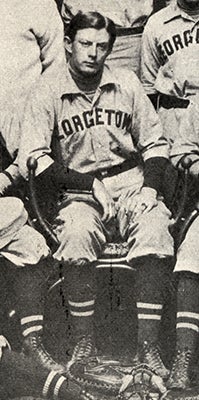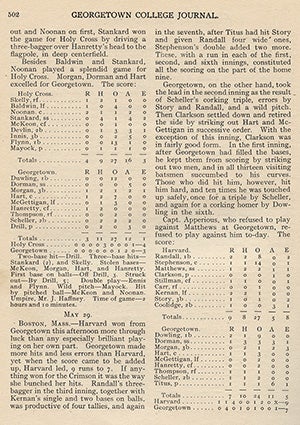 On April 18, 1903, a baseball game was scheduled between Harvard and Georgetown at Georgetown. Team rosters for the game include the names of Samuel H. “Sam” Apperious, Georgetown’s captain, and William Clarence Matthews, the Harvard starting shortstop, both of whom were from Alabama. Apperious, a catcher and later a center fielder, played for Georgetown between 1900 and 1904. He was seen as one of our best prospects and it was reported that the Boston Americans, an American League baseball club, tried to sign him. That team would win the 1903 World Series. And Matthews was even more highly considered; The Boston Post cited him as the best infielder in Harvard’s history.
On April 18, 1903, a baseball game was scheduled between Harvard and Georgetown at Georgetown. Team rosters for the game include the names of Samuel H. “Sam” Apperious, Georgetown’s captain, and William Clarence Matthews, the Harvard starting shortstop, both of whom were from Alabama. Apperious, a catcher and later a center fielder, played for Georgetown between 1900 and 1904. He was seen as one of our best prospects and it was reported that the Boston Americans, an American League baseball club, tried to sign him. That team would win the 1903 World Series. And Matthews was even more highly considered; The Boston Post cited him as the best infielder in Harvard’s history.
Apperious and Matthews did not, however, meet on Georgetown’s athletic field. In what ranks among the least proud moments in Georgetown athletic history, Sam Apperious refused to play. Why? Because Matthews was African American. The Washington Post noted in an article printed the following day:
Georgetown’s Captain and catcher, Samuel Apperious, took no part in the game. He was a resident of the same town from which Matthews . . . comes, and he declined to mix . . .
In fact, a number of Georgetown players threatened to boycott the game but all backed down except Apperious after Harvard insisted that Matthews play or they would pull out. Harvard won the game, 3 runs to 0.
Apperious also sat out later games against Harvard, in May 1903 and in 1904. In September 1904, he was appointed Graduate Coach of the Georgetown team. Soon after, seemingly unaware of the irony involved, he explained to The Washington Times that, when putting together a team, "the choice of men must be wholly on the man’s worth for the position for which he is trying."
--Lynn Conway, University Archivist
May 18, 2017

